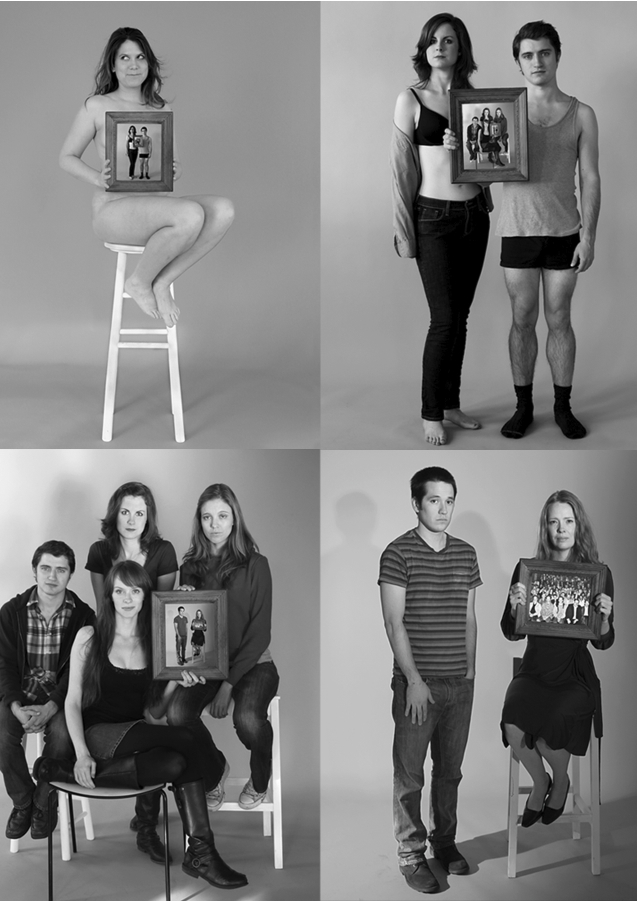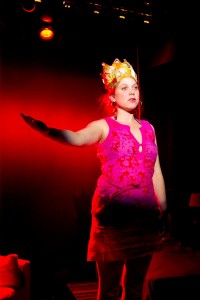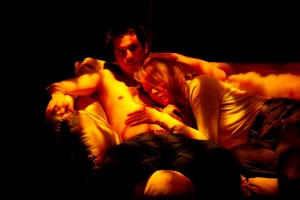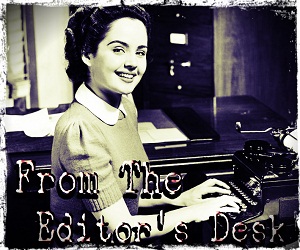
Connect Five photo by Suzi Sadler
We all want to feel deeply connected to someone else in a new way that surprises us. How that connection comes about - emotionally, physically, mentally or sexually – is actually secondary. When that unexpected connection locks in there’s a heightened state of awareness that can overpower our conventional systems and methods, an allure that can captivate our essential nature on a level that we can’t always put into words – quite possibly because some times there are no words. Some times there just is what we do, how it makes us feel, and that chance we’re willing to take to feel it again.
The four plays of Connect Five all deal with a connection that’s either surprising, suspicious, inescapable or indescribable, and the gratification (as well as the guilt), that can come about because of it.

Connect Five begins with The Make-Out Queen (written and performed by Bronwen Prosser and directed by Kathryn Walsh). Don’t let the playful John Hughes-esque title fool you, this solo act squarely showers the audience with magic, truth (sometimes brutal), honesty (sometimes heartbreaking) and beauty, finally ending on a note of triumph. The woman who presents herself to us is on a quest – not for titillation or stimulation, but a quest to bring back the intimacy that kissing underscores. (“I find making out really life affirming. Here I am squishing my face against another face, and I mean hell, my BREATH is going into another body and I am breathing THEM and you can’t step back“). The would-be Make-Out Queen (for the crown only comes if she “wins”) takes us through her 12 week quest of kissing men – and women – in the hopes of not detaching and approaching it with the same ferociousness people reserve for sex. As both playwright and actor, Ms. Prosser has a deep relationship with the words and immediately charms the audience. The message here, so pure and simple, takes on an enchanted element when told through her voice. Under Kathryn Walsh’s direction Prosser was able to finely balance this piece at the nexus of loss and triumph, hope and heartbreak, determination and doubt – and finally leaves us with a kiss, a crown, and a call to action: to go out and kiss someone like it is its own sacred complete act from beginning to end. Much like the play itself – complete from beginning to end and imbued with the passion of renewal.
Last Night (written by Wendy MacLeod and directed by Karen Kohlhaas) jumps to the other end of the spectrum; we come upon a live-in couple the morning after Juliet (Sarah Kauffman), in an effort to spice things up a little, tried something new with Eric (Michael Pantozzi) which left him curious as to where she might have learned something like that. He batters her with questions – was it a video they watched? Is she having an affair? Why is she using so much gas in the car lately; where is she going? The idea that trying something new would immediately lead to suspicion clearly underscores how disconnected this couple have become. No answer seems to satisfy Eric – no logic can mitigate the damage done by something Juliet didn’t “learn” but merely “tried”. Ironically, in the end, the only thing that seems to make sense to him at all is a comment that gives very little information. While the characters of the piece are engaging, and the topic is certainly one that could easily resonate with the audience this is still more of a play that asks a question rather than gives an answer.
In Young (written by Lucy Thurber and directed by Shannon Fillion), Ava (Kathleen Littlefield) isn’t trying anything new at all. In fact, her m.o. is one she keeps doing over and over and over – she can’t seem to sever her connection to an old girlfriend despite the fact that she’s in another relationship. We find her trying to come back to Hailey (Sarah Kauffman) “just to talk”. Hailey is both confused and flattered by Ava’s insistent attention. It’s clear, however, that Ava’s there just temporarily, regardless of how powerless she is to keep away; apparently there’s a girlfriend waiting at home. And waiting she is – when Ava tries to tip-toe in the next morning Neci (Lila Dupree) is wide awake and waiting on the couch, fully aware of what has happened without being told because, again, this is Ava and this is what Ava does. Even Ava’s long-time friend Timmy (Michael Pantozzi) knows – this is what Ava does. The question is – can she ever change? Or is this payoff always going to be a large enough one to keep her playing this twisted game?
The last piece of the night is The Room and A Richard which is the tale of two strangers who find themselves curiously connected by a dead man and his apartment. This is the most poetic of the plays, and - as such – up for the most

The Room and a Richard (Blaze Mancillas & Heather Oakley / Photo by Simon Miner)
interpretation. On the surface this is nothing but the story of a young man, Alex (Blaze Mancillas), finding out that he was Willed an unusually large Manhattan apartment by a man - a customer – whom he can’t even place. He’s in this Park Avenue spot with the recently deceased man’s sister – Cynthia (Heather Oakley)- who is all flash and fast-talk in order to cover her . . . vulnerability? Loneliness? It’s hard to tell. The play is written in a way that’s meant to volley back and forth – word play and alliteration rank high and while it can cast a dreamy tint to the piece it also never quite allows you to know what’s real and what isn’t. Which, perhaps, is the point. Regardless, they speak to each other in a way that’s more shorthand and more intimate than most conversations – let alone those held by people meeting for the first time. The actors themselves were engaging and kept the chemistry and pacing, still, this play ends on a rather quizzical final note as scenes flip and skip through time leaving the audience with a feeling akin to having just thumbed through a stranger’s haphazardly arranged photo album. Of all the connections presented theirs was, no doubt, the most cerebral and the one that asks the most of the audience – to not just passively watch but to actively engage in order to find the resonance.
The success of Connect Five lies in the subtle question that is implied at the end of each piece – What now? And that question is for the audience alone to answer; we are the fifth connection – and how we fill in that blank is what makes the circuit complete in a way that makes that connection most important to each individual who makes up that last element.
~~~
The Common Tongue’s Connect Five . Featuring works by Wendy MacLeod, Lucy Thurber, Danny Mitarotondo and Bronwen Prosser The Ars Nova Building511 West 54th Street (between 10th & 11th Avenue) January 5-16 at 8pm
Additional performances January 8-9 & 15-16 at 2pm Tickets ($18/$15 students & seniors) Click Here or call 1-866-811-4111







{ 0 comments… add one now }